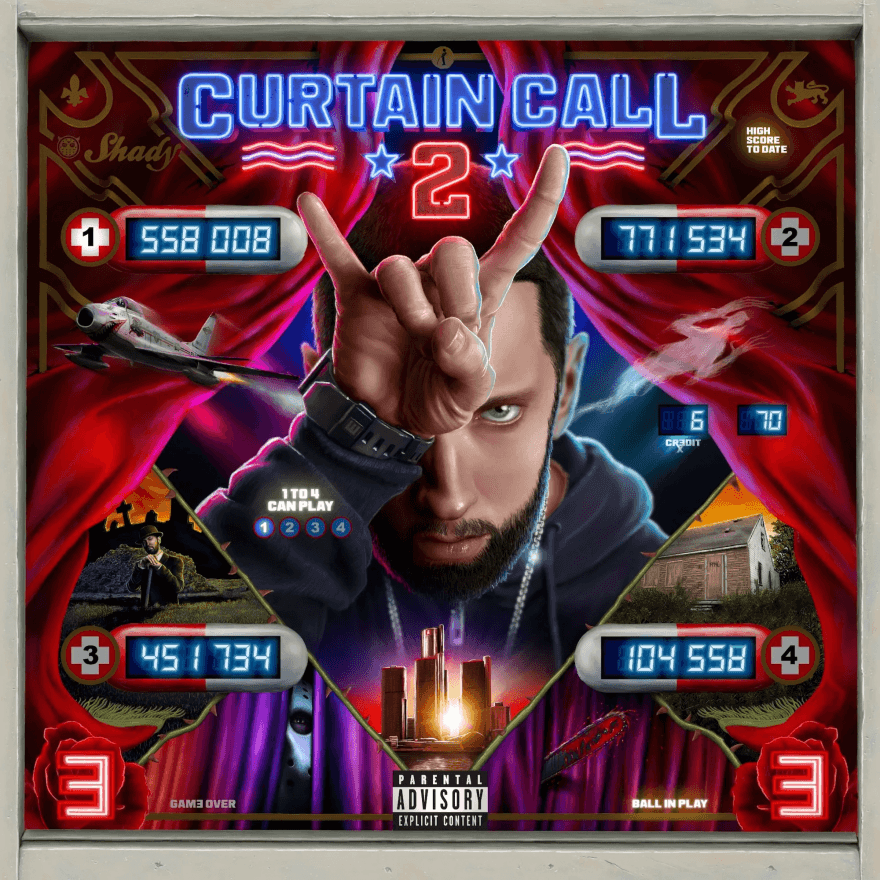Follow Anywhere the Dope Go on Twitter
This is not a greatest hits album. Despite sharing namesake with the original album, this newest compilation from Eminem serves as a revisionist history of his own career. While the quality of the first one may have aged poorly, and there was an obvious troll in the name of “Fack,” every song was undeniable. They all were hits. At some point or another, you heard all these songs somewhere. They all charted.
This isn’t the case on this new release. While streaming has changed the rules of what can chart, there are songs here that make absolutely no sense. Not only is the tracklist already absurdly bloated, topping off at thirty-five tracks, there are songs that just don’t belong. “You’re Never Over” may be a personal track, but is it a song that is thought of when looking at the best his new era? Is there any reason for the horrid flip “No Games” by Serani to be here outside the name being “Farewell?”
Eminem – Farewell
This album provides a completely different purpose than the original. It is Eminem’s own look at this new era through his own rose-tinted glasses. This is what he believes to be the hallmarks of his career. Not the audience. If it was a standard set by the audience, there wouldn’t be songs from Revival here. Let alone two of them.
One of the most egregious omissions is the Detroit posse cut, “Detroit vs. Everybody.” It set hip hop on fire for a small provide of time, seeing respective cities to create their own team ups (see Boston vs. Everybody & Icewear Vezzo’s own Detroit Over Everything). This small cut from the tracklist just further proves Eminem’s own detachment from the city that made him. This along with his disdain for the new style of flow that comes from the city’s scene highlight he’s become more & more insular.
Eminem, Royce da 5’9″, Big Sean, Danny Brown, DeJ Loaf & Trick Trick -Detroit vs. Everybody
I am too volatile and too grizzly to bear
Yeah, shit is gettin’ to where I can barely even sit in a chair
I bust my ass for this shit and I swear
It ain’t even worth dissing someone so offbeat
That they can’t even figure out where their words
Should hit the kick and the snare
Eminem’s diss towards Tee Grizzley on “You Gon’ Learn”
At least he put his boy Yelawolf though on here right? Right?
If you weren’t sold on Eminem’s career in the last ten years, this will not change your mind. As he’s transitioned into a more pop than hip hop role, this has made for music that sounds more dated than his older material. That older sound at the least sounded genuine, clean Dr. Dre mixing & production by Bass Brothers sound like a product of their own world. Outside of the Relapse tracks, every track can easily be pinpoint to the trends at the time of their release.
Whether its the overproduced arena feel of Recovery, the petty trap flows of Kamikaze, that period of time Ed Sheeran was inescapable, its all here. Upon revisiting, he’s clearly proud of losing his roots too. As even on the six minute rant that is “Rap God,” he states:
I make elevating music, you make elevator music
“Oh, he’s too mainstream.”
Well, that’s what they do when they get jealous, they confuse it
“It’s not hip-hop, it’s pop,”—’cause I found a hella way to fuse it
With rock, shock rap with Doc
Eminem – Rap God
There are a couple bonus moments for those passionate enough to stomach this tracklist. There’s a completely unnecessary remix of “Rap God,” which is somehow more overdone production wise than the original. There’s the track “Is This Love (’09),” which is an unreleased track recorded during the rumored Relapse 2 sessions. While the vocals here are re-recorded by both him & 50 Cent, there’s a real playful tone to the style of flow they go with. This track, along with the other Relapse tracks, sound like they come from a completely different artist than the one on the rest of the tracklist.
Unlike the recent expanded edition of The Eminem Show, which showcased Em’s own skills on production & thoughts on the overzealous gun-toting machismo that still dominates today, this is devoid of that. Its a collection of moments of insecurity, such as the whining of “Walk on Water” or the self-inflicted detachment of the genre on “Rap God.” The tracks that go over his recovery from addiction are heartening, but there’s so many here that you might as well just relisten to Recovery. The original Curtain Call showed why Eminem was such a creative force, meanwhile Curtain Call 2 makes you question all of it.

